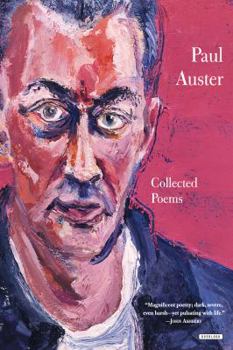Paul Auster Collected Poems
Select Format
Select Condition 
Book Overview
Paul Auster?s penetrating and charged verse resembles little else in recent American poetry. This collection of Auster?s poetry, translations, and composition notes from early in his career do much to... This description may be from another edition of this product.
Format:Paperback
Language:English
ISBN:1585679119
ISBN13:9781585679119
Release Date:June 2007
Publisher:Harry N. Abrams
Length:205 Pages
Weight:0.60 lbs.
Dimensions:0.6" x 6.1" x 9.0"
Age Range:18 years and up
Grade Range:Postsecondary and higher
Related Subjects
PoetryCustomer Reviews
1 rating
Austere Auster
Published by Thriftbooks.com User , 17 years ago
I've enjoyed all that I've read of Paul Auster's fiction and essays, so I was eager to delve into his poetry. Not surprisingly to anyone whose read his prose, much of Auster's poetry focuses on the landscape of chance. The drifts of collected coincidence within the stochastic that culminate in meaning. It's the struggle to resist chance without embrcing fate. All the while, one feels from Auster a desperate desire to stand outside it all, though he is acutely aware of the paradox within that desire. It is the abstract laboring to be concrete. Shrodinger's Poet. "Collected Poems" starts with poetry from the early seventies, when Auster was in his early twenties. They are bleak and gloomy in tone and yet do have a lyrical musical tone that creates some forward momentum. They made me think of some of the kids I knew in college, the front-row philosophy majors that were a little lost in their own heads. From 1970's "Spoke," (11): To see is this other torture, atoned for In the pain of being seen: the spoken, The seen, contained in the refusal To speak, and the seed of a single voice, Buried in a random stone. My lies have never belonged to me. We then move forward in time to the mid and late seventies, weightier ruminations such as "Disappearances," "Fragments from Cold," and "Facing the Music." From "Fragments from Cold:" Because we go blind in the day that goes out with us, and because we have seen out breath cloud the mirror of air; the eye of the air will open on nothing but the word we renounce: winter will have been a place of ripeness. We who become the dead of another life than ours. We then step back in time and read some of Auster's translations of the French poets who were his early influences. Then some unpublished "Notes From a Composition Book" from 1967, a succession of statements attempting to construct a philosophy on reality, epistemology, the nature of language, art, and so on. For example, number 10: "The eye sees the world in flux. The word is an attempt to arrest the flow, to stabilize it. And yet we persist in trying to translate experience in language. Hence poetry, hence the utterances of daily life. This is the faith that prevents universal despair- and also causes it." It ends on number 13, with the conclusion that if words fail him, he is nothing. A little self-indulgent and pretentious at times, but that goes with the territory. Overall much of it is beautiful writing and all of it is well worth reading. This early work also functions as the back-story, helping me appreciate Auster's prose in a deeper way. Recommended, thumbs up, if you are an Auster fan it should be mandatory.




